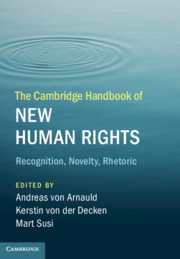Book contents
- The Cambridge Handbook of New Human Rights
- The Cambridge Handbook of New Human Rights
- Copyright page
- Contents
- Figures
- Contributors
- Acknowledgements
- Introduction
- Part I Cross-Cutting Observations
- Part II Public Good Rights
- Part III Status Rights
- Part IV New Technology Rights
- Part V Autonomy and Integrity Rights
- The Right to Bodily Integrity
- The Right to Mental Integrity
- Rights Relating to Enforced Disappearance
- The Right to Diplomatic and Consular Protection
- 34 The Emergent Human Right to Consular Notification, Access and Assistance
- 35 From a Human Right to Invoke Consular Assistance in the Host State to a Human Right to Claim Diplomatic Protection from One’s State of Nationality?
- Part VI Governance Rights
- Index
35 - From a Human Right to Invoke Consular Assistance in the Host State to a Human Right to Claim Diplomatic Protection from One’s State of Nationality?
from The Right to Diplomatic and Consular Protection
Published online by Cambridge University Press: 04 January 2020
- The Cambridge Handbook of New Human Rights
- The Cambridge Handbook of New Human Rights
- Copyright page
- Contents
- Figures
- Contributors
- Acknowledgements
- Introduction
- Part I Cross-Cutting Observations
- Part II Public Good Rights
- Part III Status Rights
- Part IV New Technology Rights
- Part V Autonomy and Integrity Rights
- The Right to Bodily Integrity
- The Right to Mental Integrity
- Rights Relating to Enforced Disappearance
- The Right to Diplomatic and Consular Protection
- 34 The Emergent Human Right to Consular Notification, Access and Assistance
- 35 From a Human Right to Invoke Consular Assistance in the Host State to a Human Right to Claim Diplomatic Protection from One’s State of Nationality?
- Part VI Governance Rights
- Index
Summary
The argument I am going to make in this short comment is inevitably broad brush. Rather than further discuss the particulars of David Stewart’s eye-opening views on the status of consular assistance in the host state, I want to examine what might be some of the indirect implications of such recognition, and whether it might be taken much further. In particular, I want to suggest that if consular assistance is indeed a human right, then it is a human right that can be invoked both by individuals against the host state (as David Stewart argues) and also vis-à-vis the state of nationality. In other words, it takes two things for the right to consular assistance to be realised: for the host state to notify foreigners of their right to be assisted; and for the state of nationality to actually provide such assistance. Examining the latter involves consideration of the broader but neglected question of a state’s duty to its nationals abroad.
- Type
- Chapter
- Information
- The Cambridge Handbook of New Human RightsRecognition, Novelty, Rhetoric, pp. 453 - 460Publisher: Cambridge University PressPrint publication year: 2020

